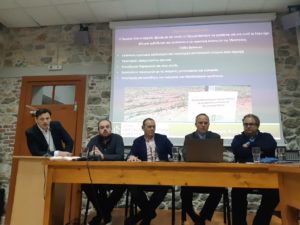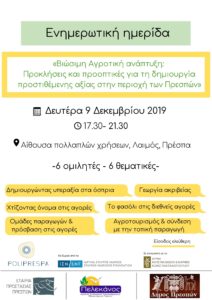The seminar was divided into two parts. The presentations in the first part unfolded as follows:
Mr. Elias Kalfas, agronomist from the American Farm School, discussed how new technologies can become allies for farmers, helping them fully utilize their resources and anticipate problems in the field. He also introduced precision agriculture and its benefits, using specific examples from vineyards in Thessaly and Macedonia.
Mr. Dimitris Gremylogiannnis, farmer, founder, and CEO of Agrifarm IKE, analyzed ways to add value to legumes.
Mr. Nikos Archontis, economist and expert in international markets at Deutsche Gesellschaft für Internationale Zusammenarbeit (GIZ) GmbH, presented the journey of beans in global markets, trends, competition, and the current state and prospects of Greek exports.
Mr. George Kokkinos, president of the “Nileas” olive producers group from Messinia, focused on the advantages of producer cooperation, the essential conditions for the smooth operation of a group, and the risks involved. “Nileas” is a successful example, which, as Mr. Kokkinos noted, requires continuous effort and vigilance.
Mr. Sandros Charalampopoulos, director of international development at Mediterra AE (a commercial company of Chios mastic producers), spoke about building a product’s brand in markets and maintaining satisfactory sales levels, providing examples from the promotion of mastic products worldwide. He emphasized that it is important to offer the story behind the product, highlighting that in Prespa, nature, the landscape, and the microclimate provide ready-made advantages for promoting beans.
Mr. Xenophon Kappas, general manager of the Captain Vassilis & Carmen Konstantakopoulos Foundation, concluded the presentations by discussing the foundation’s activities, with a focus on promoting agricultural products and agrotourism. He stressed that Prespa has the potential to organize rural tourism, provided there is tourist infrastructure, strong agricultural products, and a recognized destination identity. He noted that a strategic plan and proper organization are needed for both tourism professionals and producers to benefit.
In summarizing the presentations, the coordinator, Mr. Papathanasiou, spoke about the opportunities highlighted for each producer to form synergies to market their production at a satisfactory price and with good terms. He emphasized that the examples given by the speakers essentially encourage personal action, private initiative, and consistency in collaborations.
In the second part of the event, the audience asked questions to the speakers and made comments on the topics of the presentations. The discussion naturally extended to urgent issues of agriculture in the area raised by attending farmers and local government representatives (construction of a new irrigation network, status of farmworkers, ELGA compensations, tax and insurance status of farmers, etc.).
The seminar concluded with networking among attendees and speakers, leaving positive impressions on everyone.



